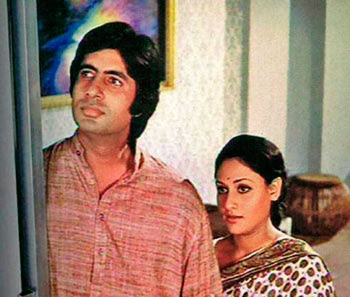Mili feels like Bollywood absorbing the morbid lessons of Love Story (released five years earlier), chiefly that there might be something cathartic - and potentially profitable - in the snuffing-out of a vibrant female spirit. Director Hrishikesh Mukherjee could scarcely have chosen a more vibrant spirit to snuff out. Jaya Bhaduri, previously an ensemble player in this director's Bawarchi, is now positioned front-and-centre as the eponymous Mili, a beloved young woman succumbing to an unspecified sickness. In the Ryan O'Neal role, her upstairs neighbour Shekhar, reclusive son of a rich man hanged for murdering his wife; the character is afforded such a thunderous build-up (first mentioned amid frenzied neighbourhood gossip, first seen in silhouette at his window, trilling a lonely song that drifts down to reach our heroine's ears) that he could perhaps only be played by one man: Amitabh Bachchan. For a while, the film shapes up less as a love story than a battle of wills: grouchy, self-loathing sot against the absolute sweetheart from down the way. Though the latter would appear doomed by the movie fates, her goodness is such that surely some of it has to rub off on this guy before the closing credits roll.
Those are the leads - and, by this point, real-life husband-and-wife - but, as in Bawarchi, Mukherjee proves at least as interested in everybody else living under this roof; he clearly subscribes to the notion it takes a village to raise (and mourn) a child. Mili and Shekhar's apartment building is populated by fretting aunties in fuchsia-pink saris, and there's a signature setpiece at a dinner party, as more and more guests show up unannounced. It's soon evident this is no place for a recluse who wants to stay that way: the local scamps are afforded free passage into most of the residents' homes, and it's their goofy, gappy smiles that first reopen the door to Shekhar's heart. In the 21st century, I would advise not going near it if you were feeling remotely cynical, although Mukherjee was talent enough to win even sceptics over. His use of colour approaches those old MGM melodramas: you could publish a book composed of still photographs of these interiors, and call it Super Shades of the Seventies. And there are poetic touches besides. It feels cosmically right that the apartment block should sit under a flight path, the better to observe souls ascending on a regular basis, and it's almost inevitable that Shekhar's astronomy habit should eventually prompt a monologue about stars being the shimmering remnants of loved ones. Much of it does seem written in those stars: the second half is a slow decline typical of terminal-illness narratives, heading towards a vaguely evasive ending that doubtless had 1975 audiences weeping in the aisles. Yet the penhand is skilful, and sensitive with it.
Mili is now streaming via Prime Video.

No comments:
Post a Comment